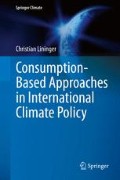Abstract
This concluding chapter summarizes the main results of this study. The view of some authors that industrialized countries can easily and quickly improve the environmental effectiveness of unilateral climate policies by introducing consumption-based approaches is challenged. This study has found that none of the arguments typically presented in support of consumption-based policies can, in fact, guarantee their effectiveness. Rather, whether a production-based or a consumption-based climate policy is environmentally more effective or more cost-effective depends on the size of the abating coalition, demand, production, and trade parameters, and the exact design of the policy instrument used. In particular, the effectiveness of consumption-based approaches depends crucially on whether they incentivize a “greening” of production technology in developing and emerging economies. It is argued that in the short run—when using border adjustments as a policy instrument—the desirable incentive effects can be secured only if it is possible to achieve at least a certain level of cooperation with the countries affected by the border measures. In the long run, a “carbon-added” scheme could be introduced instead of border adjustments—this would further policy effectiveness, but require an even higher level of international cooperation. Thus, consumption-based approaches should best be discussed not as an additional “tool” of unilateral climate policy, but rather as a possible intermediate step on the way to a fully multilateral abatement strategy.
Access this chapter
Tax calculation will be finalised at checkout
Purchases are for personal use only
Notes
- 1.
See Sect. 1.2 for a more detailed presentation of these arguments and the respective references.
Reference
UNEP (2013) The emissions gap report 2013. United Nations Environment Programme (UNEP), Nairobi
Author information
Authors and Affiliations
Rights and permissions
Copyright information
© 2015 Springer International Publishing Switzerland
About this chapter
Cite this chapter
Lininger, C. (2015). Conclusion. In: Consumption-Based Approaches in International Climate Policy. Springer Climate. Springer, Cham. https://doi.org/10.1007/978-3-319-15991-1_12
Download citation
DOI: https://doi.org/10.1007/978-3-319-15991-1_12
Published:
Publisher Name: Springer, Cham
Print ISBN: 978-3-319-15990-4
Online ISBN: 978-3-319-15991-1
eBook Packages: Earth and Environmental ScienceEarth and Environmental Science (R0)

